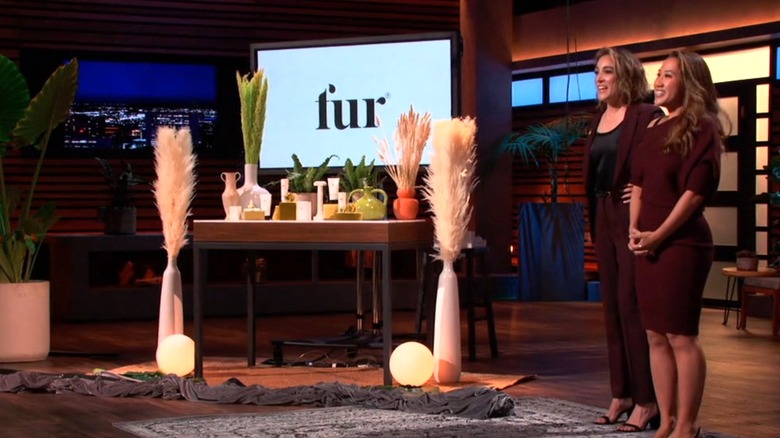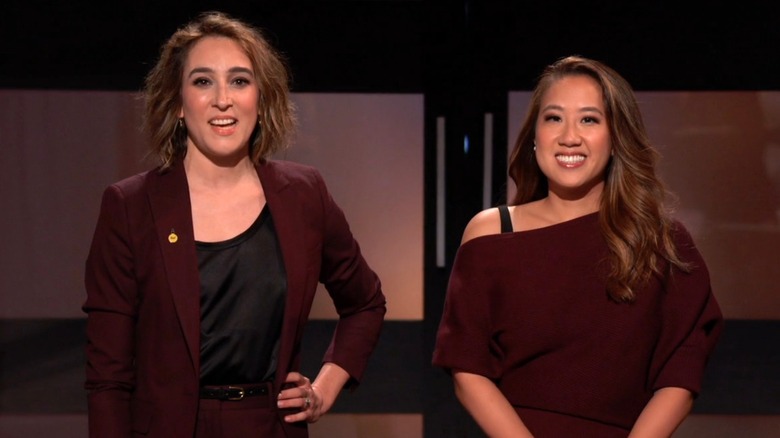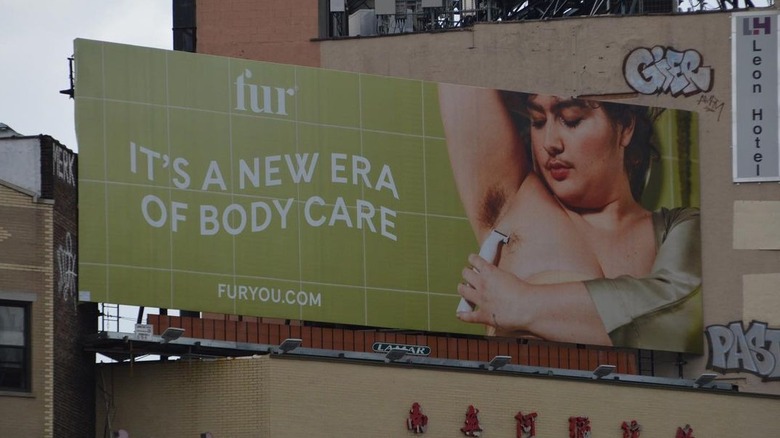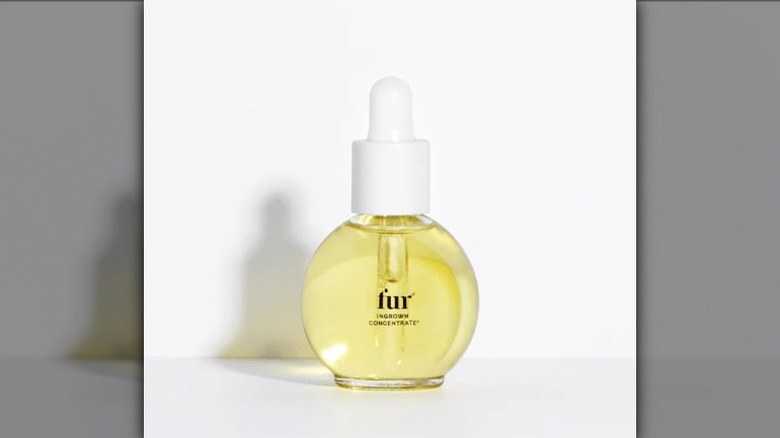Here's What Went Down With Fur After Shark Tank
We may receive a commission on purchases made from links.
We all have pubic hair, so why is it so uncomfortable for people to talk about? This question inspired the hair and skin care brand Fur, founded by childhood best friends Laura Schubert and Lillian Tung. Back in 2014, Schubert realized that most brands have only encouraged people to remove their pubic and body hair, rather than giving them other options to care for it. So, she developed an oil that would cater to people who choose to shave, wax, or keep it "au naturel." After all, body hair is personal; you can do whatever you want with it.
At the start, Schubert and Tung faced challenges due to the "taboo" nature of their branding. Some retailers tried to push them to take the word "pubic" off the packaging, according to an interview with Entrepreneur. But they stayed true to their mission and didn't listen to the haters. The brand really began to take off in 2017 when actor Emma Watson raved about the product in an interview with Into the Gloss. "She really understood our product, and we sold out of two years' worth of product in three weeks. That was definitely a moment that put our brand very much on the map," Schubert shared, via Entrepreneur. In 2020, Schubert and Tung pitched Fur on the hit ABC show, "Shark Tank" to take the brand even higher. Three years later, Fur is leading the way in the personal care industry, and they've gone beyond just their oil.
What happened to Fur on Shark Tank?
Fur co-founders Laura Schubert and Lillian Tung initially asked the sharks for $500,000 in exchange for 2.5% equity in their pubic hair care company. Knowing that this was a big ask, they knew they had to sway the sharks with their impressive numbers. They shared how the company raked in $3.5 million through Amazon and direct-to-consumer website sales during that year of filming. Though Fur caught their attention, not all the sharks could get on board. Mark Cuban didn't feel like he was the right fit for the company. Guest shark Maria Sharapova dropped out as well, as she felt 2.5% equity was not enough for her to invest.
One by one, the other sharks put out their own offers. Daymond John offered $500,000 for 15% equity. Kevin O'Leary offered $500,000 for 2.5% along with a $1 per unit royalty. Lori Greiner then weighed in with her offer of $500,000 at 12% equity and $50,000 to go towards a charity that promotes healthy body image. Schubert and Tung wanted to keep the equity percentage low, so they then asked $500,000 for 5% equity, which the sharks declined. Things became tense on the "Shark Tank" stage, but Schubert and Tung refused to walk out of there without a solid offer. At a crossroads, Greiner then agreed to raise her offer to $500,000 for 8%, along with her charity component, which Shubert and Tung accepted.
Fur after Shark Tank
According to Insider Growth, Fur's deal with Lori Greiner did not close. But even when "Shark Tank" deals don't work out, being on the television show is tremendously helpful for exposure. On the New York Launch Podcast, Schubert explained, "There was definitely increased sales and traffic to our website for sure ... we just think that having the opportunity to get in front of that many people, seeing the comments ... that was really powerful."
Their episode aired in 2020, and the brand was still able to survive through the height of the COVID-19 pandemic thanks to their online storefronts. Fur released many new products after being on "Shark Tank," including their cordless and water-resistant Fur Trimmer, made for any area of the body. In 2021, Fur celebrated its first out-of-home (OOH) advertising campaign, where they pasted street-level posters and billboards across Los Angeles and New York City. This campaign earned them the Beauty Independent Best Campaign Award, thanks to their thoughtful storytelling about embracing body hair.
Is Fur still in business?
Fur is indeed going strong, In April 2023, co-founders Laura Schubert and Lillian Tung attended Ulta Beauty's Field Leadership Conference, where they won the "Brand of the Year, Body" award. Later on in August, Fur released its brand new ingrown deodorant, made not only to target odor but also to prevent ingrown hairs in the underarm area. They shared the deodorant on the streets of New York City, setting up a stand to showcase the brand to people passing by. Then in late 2024, the company released a styling balm called Control, essentially a nourishing pomade for pubic hair (or anywhere else not usually served by haircare products, such as under your arms).
The brand has built an entire line of unique skin and hair care products for all genders, from their signature oil and ingrown eliminator serum to body wash and stubble cream. They cater to many different concerns, including ingrown hairs, razor burns, bumps and irritation, dry skin, and keratosis pilaris. There's truly something for everyone. You can also buy their kits that combine a few products together in one order. Fur does lean towards the pricey side, but most customers will rave about how good the products are. Just looking at Amazon reviews alone, the products have an average of at least 4 stars out of 5. Fur products are sold on their website, Amazon, and major retailers like Ulta, Nordstrom, Blue Mercury, Credo Beauty, Goop, and beyond. You can finally say goodbye to your razor bumps and ingrown hairs.
What's next for Fur?
The Fur team is focused on continuing to grow and continuing its mission of helping others embrace their body hair. In an Instagram post in April of 2023, CEO Laura Schubert wrote, "Every year, the Fur team has become bigger and stronger than the year before." A lot of the success comes from being able to sell both online and in retail stores. Above all else, the co-founders hope to continue their mission of changing the way people talk about pubic hair, so everyone can be more comfortable in their own skin.
We may also see even more social impact from Fur in the future. Over the years, Laura Schubert and Lillian Tung have used their brand to support causes they care about. In 2019, Fur worked with other women-owned to take out an entire spread in the New York Times to support abortion rights, and they donated to Yellowhammer Fund, a pro-choice non-profit organization in Alabama. In 2020, Fur donated a percentage of profits to the NAACP Legal Defense Fund to support BIPOC in their community. In the midst of the COVID-19 pandemic, Fur gave away over 500 oils to frontline healthcare workers. Co-founder Lillian Tung has also spoken out against the violence towards AAPI people in the U.S. and donated to organizations. Fur truly stands out as a brand that cares about making a difference.
"Shark Tank" is available for purchase on Prime Video.




